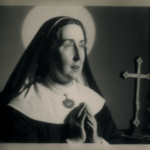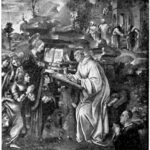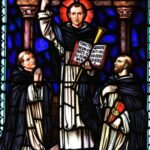
St. Athanasius
St. Athanasius
St. Athanasius – The Defiant Defender of Orthodoxy
When he lived:
St. Athanasius was born around the year 296 AD and lived until May 2, 373 AD. He was a prominent Christian theologian, bishop, and one of the most influential figures during the early centuries of Christianity.
Where he lived:
St. Athanasius hailed from Alexandria, Egypt, a city renowned for its intellectual and cultural vibrancy during the Roman Empire. Alexandria’s diverse population allowed Athanasius to be exposed to a wide range of ideas and philosophies, shaping his thoughts and convictions as he grew older.
Notable world events during the time of his life:
- The Edict of Milan (313 AD): This pivotal edict, issued by the Roman Emperors Constantine the Great and Licinius, granted religious tolerance to Christians across the Empire, ending the persecution they had faced for centuries. This landmark event marked the beginning of Christianity’s journey towards becoming a state-recognized religion.
- The Council of Nicaea (325 AD): St. Athanasius played a crucial role in this momentous ecumenical council held in Nicaea, present-day Iznik, Turkey. The council aimed to address the Arian controversy, a heretical belief questioning the divinity of Christ. Athanasius passionately defended the Orthodox view of the Trinity and the full divinity of Jesus Christ. His unyielding stance earned him the title “Father of Orthodoxy.”
- The Great Persecution (303-313 AD): During his early years, Athanasius experienced the horrors of the Great Persecution, a series of Roman-led persecutions against Christians. These trials and tribulations strengthened his resolve and commitment to the faith, preparing him for the challenges that lay ahead.
- The Death of Constantine (337 AD): The passing of Emperor Constantine the Great brought about political instability and religious uncertainties. Athanasius found himself embroiled in various power struggles and exiled multiple times for his unwavering adherence to Orthodox Christianity.
- The First Barbarian Invasions (350 AD): The Roman Empire faced external threats during Athanasius’ life, as Germanic tribes began to invade its borders. This era marked the beginning of significant socio-political changes that would later lead to the fall of the Western Roman Empire.
His patronage:
St. Athanasius is widely recognized as the patron saint of theologians, apologists, and scholars due to his relentless dedication to upholding the truth of Christian doctrine. Additionally, he is considered the patron saint of Coptic Christians, as he played a significant role in shaping the Coptic Orthodox Church in Egypt.
St. Athanasius’ life was a rollercoaster of faith, resilience, and intellectual prowess. His legacy as a defender of Orthodox Christianity continues to inspire people to stand firm in their convictions, even in the face of adversity. Through his writings and actions, he exemplified how one person’s unwavering dedication can profoundly impact the course of history and shape the future of religious thought.
St. Alexander’s Protégé
Most probably, St. Athanasius was born in Alexandria, Egypt, about the year 300. He was given a good education during his youth. He received philosophical and theological training in Alexandria. He became a deacon and secretary to Alexander, the Bishop of Alexandria. As a close collaborator of his bishop, Athanasius took part with him in the Council of Nicaea, the first Ecumenical Council convened by Emperor Constantine in the year 325, which was aimed at ensuring unity in the Church.
Athanasius was recognized as an exceptional theologian and ascetic and was regarded as the obvious candidate to succeed Alexander. When Bishop Alexander died in 328, Athanasius succeeded him as Bishop of Alexandria. His first years as bishop were devoted to the visitation of his extensive patriarchate, which included the whole of Egypt and Libya. He established important contacts with the Coptic monks of Upper Egypt and their leader, St. Pachomius.
Defenders of Orthodoxy
Most of all, Athanasius showed straightaway that he was determined to reject any compromise with regard to the Arian heresies condemned by the Council of Nicaea. He zealously worked to defend the faith and the Church’s teachings and to affirm the convictions of the Nicene Fathers to address various issues and the serious problem that had arisen from the erroneous preaching of Arius. With his theory, Arius threatened authentic faith in Christ. He declared that the Logos was not a true God but a created God, a creature “halfway” between God and man. Hence, said Arius, Christ remained forever inaccessible to us.

Soon, Athanasius began to face the struggle with imperialist and Arian churchmen, a toil that occupied much of his life. His unwillingness to accede to them and, if necessary, his sometimes harsh response against those who opposed his appointment as bishop and especially against those who disagreed with the Nicene Creed provoked the unsparing hostility of the Arians. Despite the unanimous declaration of the Council, these erroneous ideas once again began to prevail. They were upheld for political reasons, especially to safeguard the unity of the empire.
Hence, the Arian crisis, which was believed to have been resolved at Nicaea, persisted for decades, along with complicated events and painful divisions in the Church. During his thirty years as bishop, Athanasius was obliged to leave his city at least five times. He spent seventeen years in exile, suffering for the faith.
Exile and Return
However, despite his banishment, Athanasius was able to sustain and spread the Nicene faith in the West. He lived among the hermits in the Egyptian desert with the help of St. Anthony, considered to be the most important champion of Athanasius’ faith. He had to move from one hermitage to another to escape the Arians, who were plotting against him. Again and again, he proclaimed that Jesus Christ was truly God.
Finally, Athanasius was able to return to Alexandria in 365. He was reinstated in his see and devoted himself to religious pacification and the reorganization of the Christian communities. He died there around the year 373. A few years later, the church declared that Arianism was a heresy. So the belief that Jesus is divine was passed down to us because of Athanasius, the champion of right belief. His feast day is May 2.
Five Interesting Facts About St. Athanasius
- St. Athanasius is also referred to as St. Athanasius of Alexandria, Athanasius the Great, Athanasius the Apostolic, or Athanasius the Confessor.
- St. Athanasius is one of the great doctors of the Church.
- St. Athanasius was such a close friend of the great hermit St. Anthony that he received one of the two sheepskins that Anthony left as his legacy. St. Athanasius wrote the biography of St. Anthony the Abbot.
- St. Athanasius is called “the father of orthodoxy” for his absolute dedication to the doctrine of Christ’s divinity.
- St. Gregory Nazianzen, who presided over part of the Council of Nicaea, described St. Athanasius as “the true pillar of the Church”.
Prayer to St. Athanasius
Almighty, ever-living God, who raised up the Bishop Saint Athanasius as an outstanding champion of your Son’s divinity, mercifully grant that, rejoicing in his teaching and his protection, we may never cease to grow in knowledge and love of you. Through our Lord Jesus Christ, your Son, who lives and reigns with you in the unity of the Holy Spirit,God, for ever and ever Amen.



